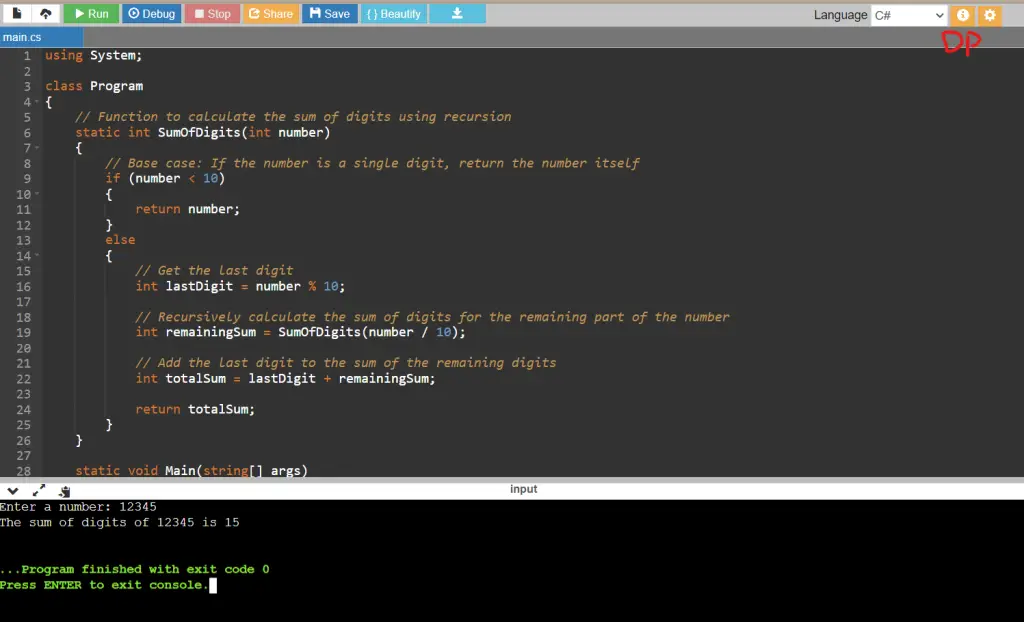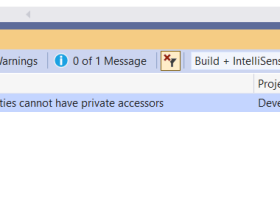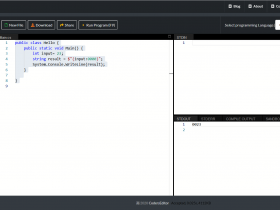C# Program to Find Sum of Digits of a Number using Recursion
This C# program calculates the sum of digits of a given number using a recursive function.
Problem statement
You are given a positive integer n. Your task is to write a recursive function to calculate the sum of its digits.
C# Program to Find Sum of Digits of a Number using Recursion
using System;
class Program
{
// Function to calculate the sum of digits using recursion
static int SumOfDigits(int number)
{
// Base case: If the number is a single digit, return the number itself
if (number < 10)
{
return number;
}
else
{
// Get the last digit
int lastDigit = number % 10;
// Recursively calculate the sum of digits for the remaining part of the number
int remainingSum = SumOfDigits(number / 10);
// Add the last digit to the sum of the remaining digits
int totalSum = lastDigit + remainingSum;
return totalSum;
}
}
static void Main(string[] args)
{
Console.Write("Enter a number: ");
int number = int.Parse(Console.ReadLine());
// Calculate the sum of digits using the SumOfDigits function
int sum = SumOfDigits(number);
Console.WriteLine($"The sum of digits of {number} is {sum}");
}
}
How it works
Sure, let’s break down how the recursive program to calculate the sum of digits works step by step:
- Input: The program takes an integer
nas input. - Recursive Function: The program defines a recursive function called
SumOfDigits, which is responsible for calculating the sum of the digits of the input number.
- Base Case: Inside the
SumOfDigitsfunction, there is a base case check. If thenumberis less than 10, it means thatnumberis a single digit (0-9). In this case, we return the number itself because the sum of a single digit is the digit itself. - Recursive Case: If the
numberis not a single digit (greater than or equal to 10), we proceed to calculate the sum of its digits recursively:- We calculate the
lastDigitby taking the remainder ofnumberwhen divided by 10. This gives us the last digit of the number. - We calculate the
remainingSumby calling theSumOfDigitsfunction recursively with the integer division ofnumberby 10. This effectively removes the last digit fromnumberand focuses on the remaining part of the number. - We calculate the
totalSumby addinglastDigitto theremainingSum.
- We calculate the
- Return: The
totalSumis returned as the result of theSumOfDigitsfunction. - Main Function: In the
Mainmethod of the program, the user is prompted to enter an integern. Then, theSumOfDigitsfunction is called withnas an argument. - Output: Finally, the program displays the sum of digits, which is the result returned by the
SumOfDigitsfunction.
The recursion works by breaking down the input number into its individual digits, calculating their sum, and then applying the same process to the remaining part of the number until the base case is reached (when the number becomes a single digit). At that point, the base case handles the termination of the recursion by returning the single digit itself.
Input/Output






Leave a Review